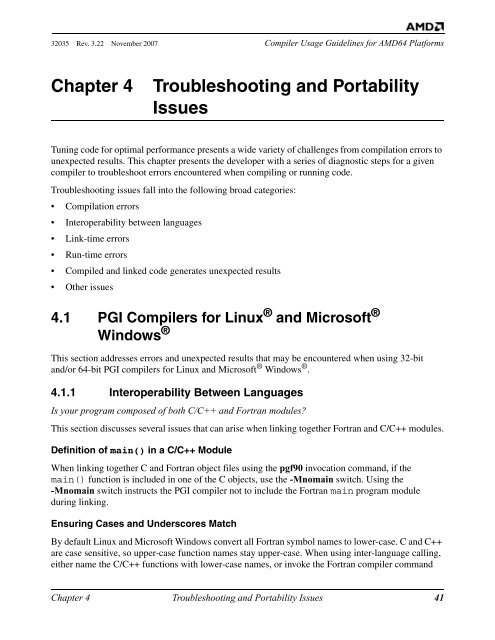Compiler Usage Guidelines for 64-Bit Operating Systems on AMD64 ...
Compiler Usage Guidelines for 64-Bit Operating Systems on AMD64 ...
Compiler Usage Guidelines for 64-Bit Operating Systems on AMD64 ...
You also want an ePaper? Increase the reach of your titles
YUMPU automatically turns print PDFs into web optimized ePapers that Google loves.
32035 Rev. 3.22 November 2007<br />
<str<strong>on</strong>g>Compiler</str<strong>on</strong>g> <str<strong>on</strong>g>Usage</str<strong>on</strong>g> <str<strong>on</strong>g>Guidelines</str<strong>on</strong>g> <str<strong>on</strong>g>for</str<strong>on</strong>g> AMD<str<strong>on</strong>g>64</str<strong>on</strong>g> Plat<str<strong>on</strong>g>for</str<strong>on</strong>g>ms<br />
Chapter 4 Troubleshooting and Portability<br />
Issues<br />
Tuning code <str<strong>on</strong>g>for</str<strong>on</strong>g> optimal per<str<strong>on</strong>g>for</str<strong>on</strong>g>mance presents a wide variety of challenges from compilati<strong>on</strong> errors to<br />
unexpected results. This chapter presents the developer with a series of diagnostic steps <str<strong>on</strong>g>for</str<strong>on</strong>g> a given<br />
compiler to troubleshoot errors encountered when compiling or running code.<br />
Troubleshooting issues fall into the following broad categories:<br />
Compilati<strong>on</strong> errors<br />
Interoperability between languages<br />
Link-time errors<br />
Run-time errors<br />
Compiled and linked code generates unexpected results<br />
Other issues<br />
4.1 PGI <str<strong>on</strong>g>Compiler</str<strong>on</strong>g>s <str<strong>on</strong>g>for</str<strong>on</strong>g> Linux ® and Microsoft ®<br />
Windows ®<br />
This secti<strong>on</strong> addresses errors and unexpected results that may be encountered when using 32-bit<br />
and/or <str<strong>on</strong>g>64</str<strong>on</strong>g>-bit PGI compilers <str<strong>on</strong>g>for</str<strong>on</strong>g> Linux and Microsoft ® Windows ® .<br />
4.1.1 Interoperability Between Languages<br />
Is your program composed of both C/C++ and Fortran modules?<br />
This secti<strong>on</strong> discusses several issues that can arise when linking together Fortran and C/C++ modules.<br />
Definiti<strong>on</strong> of main() in a C/C++ Module<br />
When linking together C and Fortran object files using the pgf90 invocati<strong>on</strong> command, if the<br />
main() functi<strong>on</strong> is included in <strong>on</strong>e of the C objects, use the -Mnomain switch. Using the<br />
-Mnomain switch instructs the PGI compiler not to include the Fortran main program module<br />
during linking.<br />
Ensuring Cases and Underscores Match<br />
By default Linux and Microsoft Windows c<strong>on</strong>vert all Fortran symbol names to lower-case. C and C++<br />
are case sensitive, so upper-case functi<strong>on</strong> names stay upper-case. When using inter-language calling,<br />
either name the C/C++ functi<strong>on</strong>s with lower-case names, or invoke the Fortran compiler command<br />
Chapter 4 Troubleshooting and Portability Issues 41



